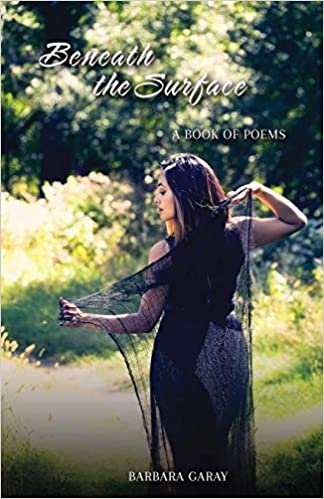Book Review: Beneath the Surface: A Book Of Poems
Beneath the Surface: A Book Of Poems. Barbara Garay. Self-published, February 22, 2019, Trade Paperback and E-book, 143 pages.
Reviewed by Mike Freveletti.
Beneath the Surface, by Barbara Garay, is a collection of poems with strong personal narrative focused on trauma, love, and respect for the adventure of life. Garay mentions the influence of thinkers such as Nietzsche, Kierkegaard, De Beauvoir, and Levinas. I found I didn’t need to be well versed in philosophy to enjoy what this collection had to offer.
The collection is broken into five thematic sections: Roots, Love, Heartbreak, Inner Struggles, and Resilience. The poet has, with the help of a photographer, interspersed black and white photos, which lend to the earnestness of the collection and further accentuates the mood of the poems.
I have never been a huge fan of rhyming poetry, but I do understand its place in the genre, and I can appreciate it when it’s done well. Reading lines like “beneath the stars/measuring/the depth of our scars/ruminating/on our immanence/while losing our innocence," you see a poet who understands pacing and how rhyming can be deployed in a way that’s pleasant to read, even out loud.
I couldn’t help but feel like I was reading a memoir in verse. A memoir is only as interesting as the subject who’s decided to let us in. When you’re treated to emotional, heartfelt writing about someone else’s experiences that could’ve only been shared through the poetic medium, I think that’s an extraordinary honor. I was offered a window into the mind of the poet talking about abuse and its ability to stick in the psyche like a parasite in the poem “Abuse”: “she hides/inside her mind/and prays for a hand that’s kind/but continual silence/ . . .” You feel the difficulty of being heard, and when the poem ends with, “with ashen waste/that is still felt/inside her mouth/this-very-day,” you get to see poetry as the perfect vehicle for the things we need to say but are sometimes unsure how.
As I read the collection, the one word that continued to flash in my mind was cohesion. Poetry collections that claim some connective tissue between poems sometimes fail in telling a story, but with this book, I felt I had gotten my beginning, middle, and end. Cohesion is not always something I require in my reading, but the author was successful with this group of poems.
Garay’s introduction describes poems as snapshots frozen in time, and she’s right. Beneath the Surface gives us a moment in time full of instances, feelings, and reckonings, all of which help us understand how each is a factor in the understanding of who we really are. She tells us a story in short bursts, which makes connections with our lives, while trying to better remember all the details therein. “We endure, we learn, we rise, and we evolve,” Garay says, and I’d say her poetry is evidence that she’s done just that.

